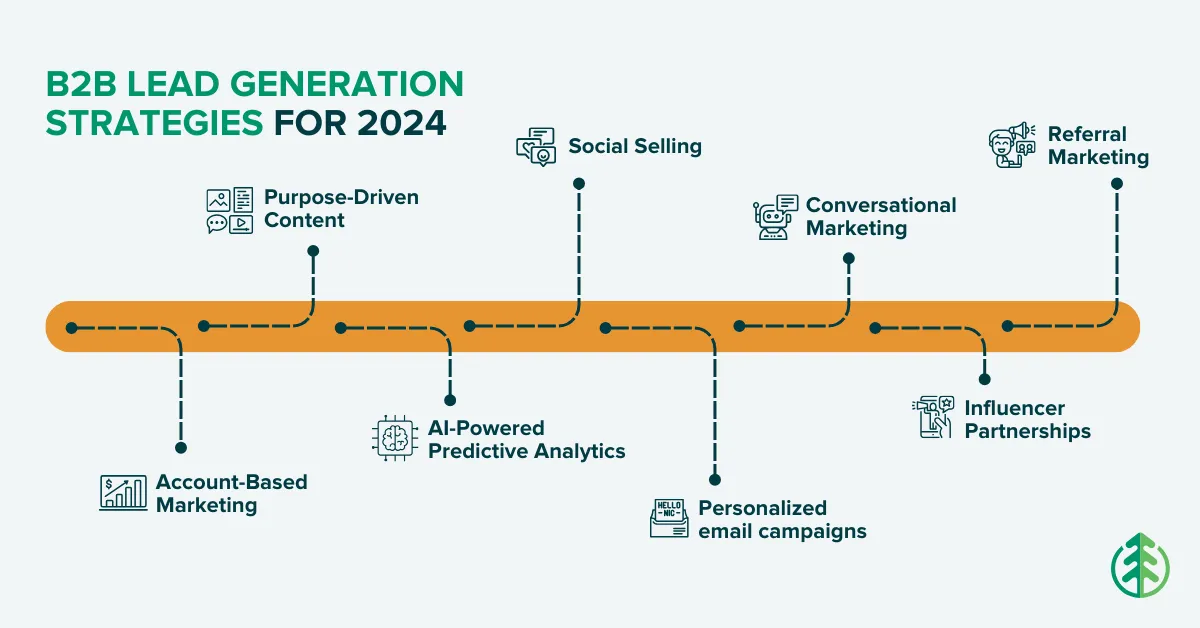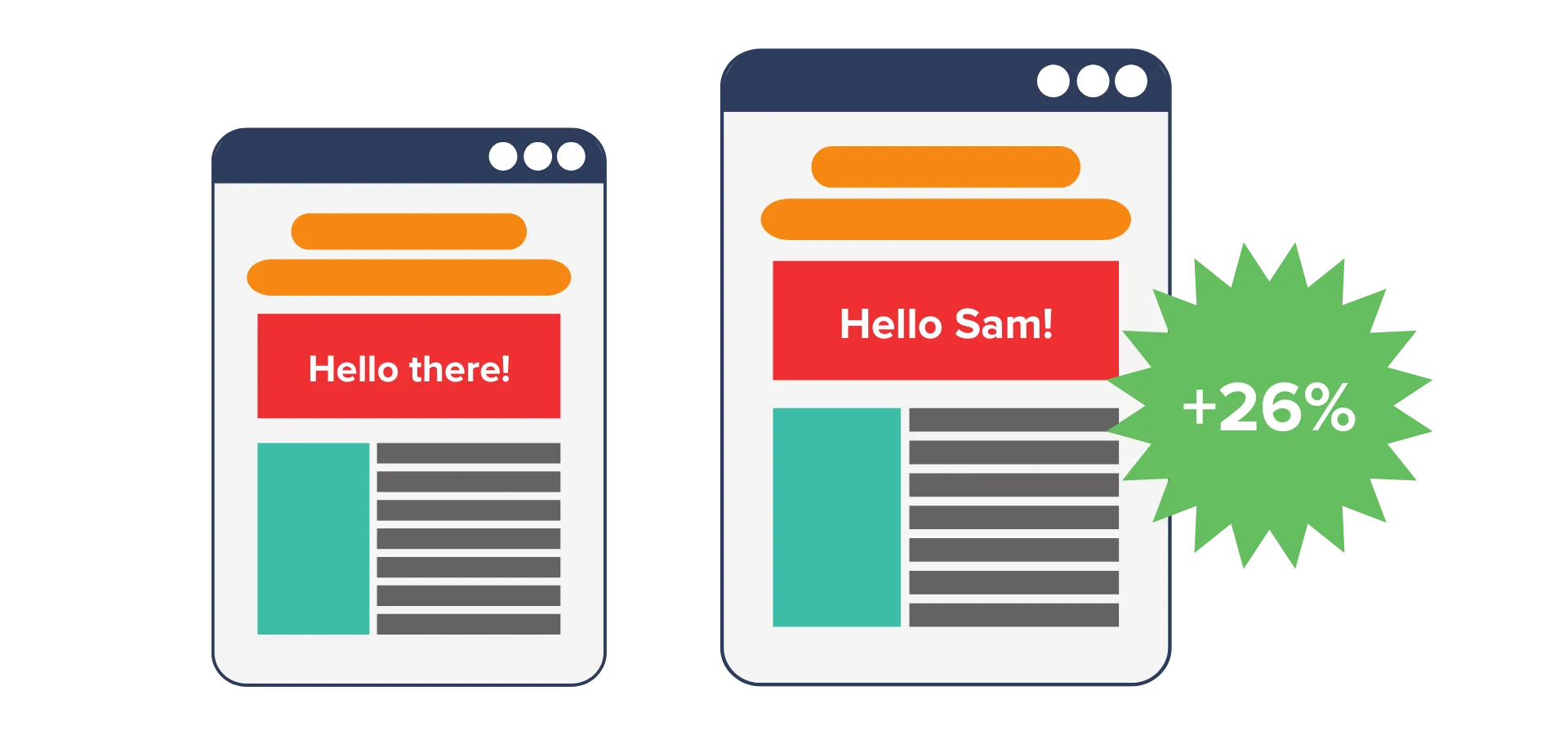Cutting-Edge B2B Lead Generation Strategies in 2024
In the dynamic realm of B2B marketing, staying ahead necessitates embracing innovative strategies. As businesses adapt, B2B lead generation evolves, taking on a more personalized, data-driven approach. This article takes you on a journey into the heart of 2024’s most influential lead generation strategies that are reshaping the marketing landscape. But before we dive into these strategies, let’s first demystify the core question: What exactly is Business-to-Business lead generation?

What is Business-to-Business Lead Generation?
This important marketing concept for businesses is the process of identifying, attracting, and nurturing potential business clients who have shown interest in a company’s products or services. Unlike B2C (business-to-consumer) marketing, which targets individual consumers, B2B marketing focuses on building relationships and converting businesses into customers.
For business-to-business brands, the goal is to attract high-quality leads that are more likely to convert into long-term customers. This involves understanding the unique needs, pain points, and challenges of businesses in a specific industry or niche. The strategies employed aim to create a personalized and tailored approach to engage potential clients, provide value, and guide them through the decision-making process.
The strategies employed in B2B lead generation can range from personalized email campaigns and content marketing to leveraging social media platforms, engaging in account-based marketing (ABM), utilizing AI-powered predictive analytics, and even collaborating with industry influencers. The overarching objective is to build a pipeline of qualified leads that have a higher likelihood of converting into loyal and long-term clients.
In essence, lead generation is the foundation of successful B2B marketing, ensuring that businesses can identify and engage with the right prospects, nurture them with relevant content and interactions, and ultimately foster strong business relationships that drive growth and success.
Top B2B lead Generation Strategies in 2024:
Now that we have demystified the essence of business-to-business lead generation, let’s embark on an exploration of the transformative strategies fueling B2B marketing in 2024:
1. Account-Based Marketing (ABM)
Account-Based Marketing (ABM) has emerged as a powerhouse B2B marketing strategy in recent years, and it continues to be a dominant force in 2024. ABM involves focusing your marketing efforts on a specific set of high-value target accounts rather than a broader audience. This strategy allows for hyper-personalization, as you can tailor your messages and content to address the unique pain points and challenges of each target account. In fact, in a Forrester survey 56% of marketers identified that personalized content is one of the main factors to achieving ABM success.
The key to successful ABM lies in the alignment between marketing and sales teams. By collaborating closely, these teams can create customized campaigns that resonate with decision-makers at the target accounts. ABM not only generates higher-quality leads but also improves conversion rates and nurtures long-lasting customer relationships.

2. Purpose-Driven Content Marketing
Content marketing remains a cornerstone for B2B marketing, but the approach has evolved significantly in 2024. Rather than creating generic content, businesses are focusing on delivering valuable and purposeful content that directly addresses the needs of their target audience. According to research conducted by HubSpot, 83% of marketers believe it’s more effective to create higher quality content less often.
Interactive content, such as quizzes, assessments, and calculators, is gaining traction as it engages prospects and provides personalized experiences. Furthermore, businesses are leveraging various formats like podcasts, videos, and webinars to cater to different learning preferences and capture leads at various stages of the buyer’s journey.
3. AI-Powered Predictive Analytics
Artificial Intelligence (AI) has transformed B2B lead generation by enabling predictive analytics. With AI, businesses can analyze vast amounts of data to identify patterns and trends that might otherwise go unnoticed. This allows marketers to predict which leads are most likely to convert and allocate resources accordingly.
AI-driven lead scoring is another application that enhances lead quality. By analyzing various parameters such as demographics, online behavior, and engagement, AI can assign scores to leads, helping sales teams prioritize their efforts and focus on prospects with the highest potential.
4. Social Selling and Relationship Cultivation
Social media has evolved from a platform for brand awareness to a powerful tool for generating leads and building relationships. In 2024, businesses are leveraging social media to connect directly with decision-makers, share valuable insights, and establish themselves as industry thought leaders.
Platforms like LinkedIn provide a fertile ground for social selling. Recent research uncovered that, 80% of B2B social media leads come from LinkedIn. Sales professionals can engage in meaningful conversations, share relevant content, and build relationships that can eventually lead to valuable business opportunities. The key is to approach social media interactions as a way to provide value rather than just making a sales pitch.
5. Personalized Email Campaigns
Email marketing remains one of the most effective lead gen strategies, but personalization has taken center stage in 2024. Recent research found that even something as simple as adding a person’s first name in a subject line can increase open rates by 26%! Generic email blasts are the thing of the past and are being replaced by highly targeted and personalized email campaigns that resonate with individual recipients.
Segmentation is the key to success in personalized email campaigns. By segmenting your email list based on factors such as industry, role, pain points, and stage in the buyer’s journey, you can tailor your messaging and content to address the specific needs of each group. Automated email sequences, triggered by specific actions or events, further enhance the personalized experience.

6. Chatbots and Conversational Marketing
In the era of instant gratification, businesses are turning to chatbots and conversational marketing to engage with prospects in real-time. Chatbots can provide immediate responses to inquiries, offer product recommendations, and guide prospects through the decision-making process.
Conversational marketing involves using live chat, chatbots, and messaging apps to initiate and nurture conversations with prospects. This approach not only captures leads but also provides a more interactive and personalized experience. It’s essential to strike a balance between automation and the human touch to ensure a positive user experience.
7. Influencer Partnerships
Influencer marketing has expanded beyond the B2C realm and is making waves in B2B lead generation as well. Collaborating with industry influencers and experts allows businesses to tap into established networks and gain credibility within their target audience.
In 2024, influencer partnerships are more focused on thought leadership than just endorsements. Businesses are co-creating content with influencers, such as joint webinars, articles, and podcasts, which provide value to the audience while also generating high-quality leads.
8. Referral Marketing
Did you know that 84% of B2B decision makers start the buying process from a recommendation they received by a friend or colleague? Harnessing the power of this powerful channel is a tried-and-true strategy that continues to be effective in 2024. With referral marketing, businesses can encourage their satisfied customers, partners, and even employees to refer potential leads. Referral programs can offer incentives or rewards for successful referrals, creating a win-win situation for all parties involved.
Referral marketing capitalizes on the trust and credibility that comes from personal recommendations. When an existing customer or partner vouches for your product or service, the leads generated through referrals often come with a higher level of trust and a greater likelihood of conversion. In a B2B context, where relationships and reputation are crucial, referral marketing can have a significant impact on lead generation efforts.
Conclusion
Business-to-business marketing in 2024 is all about personalization, data-driven insights, and building meaningful relationships. As businesses continue to navigate a rapidly changing landscape, these strategies are proving to be the driving force behind successful lead generation efforts. Whether it’s leveraging AI for predictive analytics, engaging in social selling, creating purposeful content, or implementing referral marketing, the top B2B lead generation strategies of 2024 are paving the way for sustained growth and meaningful connections in the B2B arena.